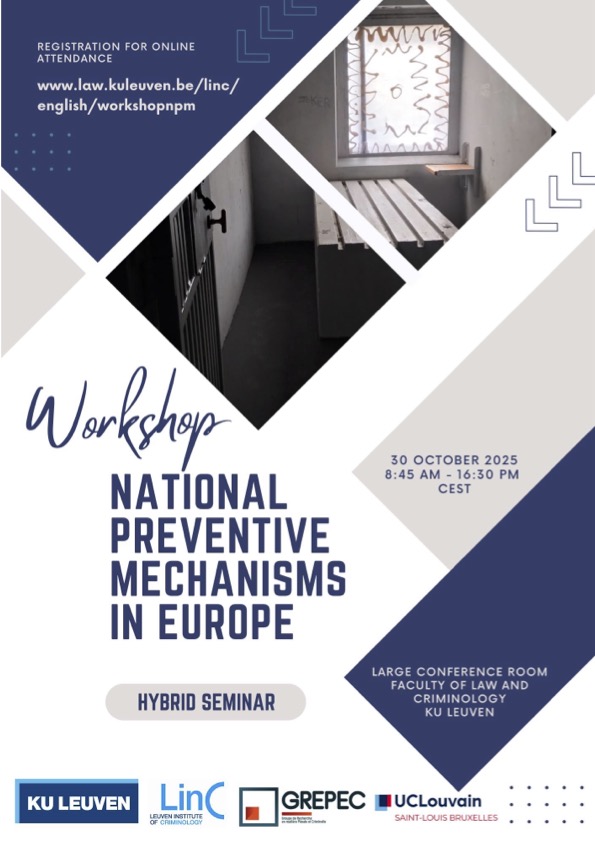
- Cet évènement est passé
Workshop on National Preventive Mechanisms (NPMS) In Europe
30 octobre 2025 à 8 h 30 - 17 h 00

Fifty years ago we saw the first steps towards developing a preventive approach towards tackling torture and inhuman or degrading treatment or punishment. In the mid-1970s Jean-Jacques Gautier, a retired Swiss banker, became interested in the predicament of political prisoners and, within a fairly brief period of time (until his death in 1986), managed to build an international coalition in support of his idea of establishing and introducing an international monitoring mechanism, that would enable a group of experts to visit places of detention in different parts of the world.
As a result the European Committee for the Prevention of Torture (CPT) (operational since 1989), the UN Subcommittee on the Prevention of Torture (SPT) (operational since 2007), and so-called National Preventive Mechanisms (NPMs) came to be established.
The methodology of these bodies is more or less the same: independent (international) experts can visit places of detention and can observe and talk freely to detainees, officials, etc. The findings and recommendations of such monitoring bodies are then written down in reports which are sent to the authorities of the visited state and form the basis of an on-going dialogue. To mark the 20th anniversary of the entry into force of the UN Optional Protocol to the Convention Against Torture (OPCAT), this workshop will focus on one major component of this growing network of monitoring
bodies, that is, the establishment of NPMs in a European context. Invited speakers coming from different parts of Europe will share their expertise on their countries’ processes in ratifying OPCAT as well as the establishment and functioning of the NPMs. Throughout the workshop, we will address the following questions:
- How are NPMs organised in European countries and what is their legal framework?
- What was the process of OPCAT ratification in European countries, and to which extent was theestablishment of NPMs supported or challenged?
- What have been the initial experiences and observations since establishing NPMs?
- How do NPMs fulfil their mandate (e.g. organisation and modalities of visits, methodology, access to places of detention, publication of results, relations with authorities and civil society, etc.)?
- What are the main challenges faced by NPMs (resource limitations, lack of cooperation from authorities, lack of access to places of detention, legal constraints, etc.)?
- To which extent have NPMs impacted policies across European countries, and what influence do they exert on policymaking?
PRACTICAL INFORMATION
The workshop will be hosted at the Faculty of Law & Criminology, College De Valk, Large Conference Room, Tiensestraat 41, Leuven.
The workshop is hybrid and online participants can join via Teams.
Participation to the event is free, but registration is required.
It is no longer possible to register for physical attendance.
For online participation, please register here: https://www.law.kuleuven.be/linc/english/workshopnpm.
PROGRAMME : PDF version here
8:45 AM – 9:00 AM: Welcome by Tom Daems (KU Leuven, member of the CPT)
9:00 – 9:20 AM: SPT and NPMs: an evolving relation by Barbara Bernath & Elina Steinerte (SPT members)
9:20 AM – 10:20 AM: First Panel
The French Contrôleur général des lieux de privation de liberté (CGLPL) : a panoptic control over confinement places – Ariane Amado (CNRS) & Julia Schmitz (Université de Toulouse Capitole)
Czech NPM: Approaching 20 years of operation and ongoing challenges – Miriam Tomášková (Office of the Public Defender of Rights – Czech NPM)
10:20 AM – 10:45 AM: Health Break
10:45 AM – 12:15 PM: Second Panel
Ten years of griefs: Italy’s NPM between an uncertain past and a troubled future – Adriano Martufi (University of Pavia)
Creation, development and future of the Dutch National Preventive Mechanism. A new horizon for prevention of torture in places of deprivation of liberty in the Netherlands? – Pauline Jacobs (Tilburg University)
The United Kingdom’s National Preventive Mechanism: Coordination and challenges – Sam Gluckstein (UK NPM)
12:15 PM – 13:30 PM: Lunch
13:30 PM – 15:00 PM: Third Panel
Prisons and forensic hospitals: Challenges and opportunities in the light of German federalism – Pascal Décarpes (National Agency for the Prevention of Torture – German NPM)
15 years of the Swiss NPM: Reflections and progress – Jean-Sébastien Blanc (National Commission for the Prevention of Torture (NCPT) – Swiss NPM)
The Austrian Ombudsman Board as National Preventive Mechanism: A unique approach combining OPCAT and CRPD mandates – Kerstin Buchinger & Johannes Carniel (Austrian Ombudsman Board – Austrian NPM)
15:00 PM – 15:15 PM: Health break
15:15 PM – 16:15 PM: Belgium’s long road to OPCAT ratification: Challenges and prospects of the new « umbrella model » for oversight bodies – Olivia Nederlandt (UCLouvain Saint-Louis Bruxelles) & Aurore
Vanliefde De Keyser (KU Leuven) with response from Claudia Bonamini (Belgian NPM)
15:45 PM – 16:30 PM: Roundtable discussion and closing remarks
ORGANISATION
This workshop is co-organised by the research line Punishment & Control, Leuven Institute of Criminology (LINC), KU Leuven and the Groupe de Recherche en matière Pénale et Criminelle (GREPEC), UCLouvain
Saint-Louis Bruxelles.
